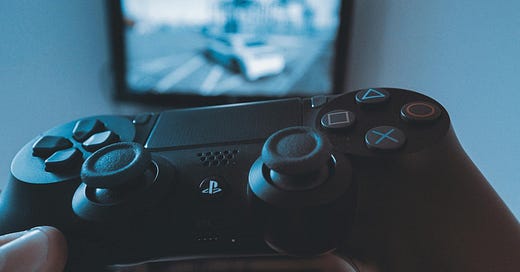Streaming video games, and the basic goods
The few objectively good things that are always reasons to act
It was one of those conversations, years ago now, when you can tell your kid’s been planning it. The deep breath, the pregnant pause, the “I want to talk to you about something…”
He launched in. He’d been thinking about it for a while, and he wanted to start streaming video games on something called Twitch. I might have been surprised if I hadn’t been so confused. What’s “streaming”? Playing online video games publicly so that other people can view it as the person plays, in real time. Ah. What’s “Twitch”? The most common platform where people do this. I see. At this point, I was surprised. And not, I’ll admit, at all delighted. With video games and phones, we were among the strictest families we knew. But there we were… and the conversation between my son and me began.
But what was the wisest way to think about such a topic? More to the point, what’s a wise way to think about any topic - to figure out what actions we should take (or, if we’re a parent, permit)? How do we figure out what is good to do?
Not long afterwards, I read these lines by a longstanding physician giving advice to a mom conflicted about her son’s excessive gaming, which she said “made him happy.” He said:
I told mom she was confusing happiness with pleasure. That’s common today. A trip to the arcade may be a source of pleasure, but it will not give lasting and enduring happiness. This mother’s son derives pleasure from playing video games, but playing video games in an online world is unlikely to be a source of real fulfillment… Pleasure is not the same thing as happiness. The gratification of desire yields pleasure, not lasting happiness.
We think of both pleasure and happiness as good; we like and want them. The doctor is saying, though, that short-term pleasure and long-term happiness aren’t the same. He’s also saying that the modern world routinely confuses pleasure with happiness. That’s also right. I needed to better understand the distinction.
I went on a quest to figure it out. How did our forebears (who, let’s be honest, were more grounded than us moderns about matters of importance) think about choosing for happiness rather than pleasure? How did they think about a thriving life? They seemed to know things we don’t. They had language we lacked.
Through my search, I discovered that it boils down to the basic goods. These are objective goods “out there,” independent of our feelings and experiences, that we humans can know and achieve. Virtually every society in every time has known them, and affirms that they’re good. Having them is always better than not having them.
The goods are:
Life
Knowledge
Beauty
Friendship
Play
Practical reasonableness (the trickiest; more on this one later)
There’s some discussion around whether this list is exhaustive; I’ve included the shortest and most agreed-on list. But scholars across the geographic and millennial spectrum – from Confucius to Aristotle to Cicero to Thomas Aquinas, and hundreds of others – concur on these goods and their necessity to fruitful lives.
If you pursue knowledge, not ignorance- you flourish. If you pursue friendship, not isolation- you flourish. If you pursue beauty, not ugliness- you flourish. You get the idea. This is the basis of natural law: the set of universal truths, derived from nature and common to all humans, that’s discovered through reason.
Flourishing over the long term is what we mean when we say “happiness.” Happiness happens, over time, when we enact (take actions pointing at) the basic goods. Pleasure, on the other hand, involves actions that feel enjoyable in the short-term but aren’t necessarily aimed at the basic goods. In fact, pleasurable actions more often than not aren’t pointing at the basic goods. When we routinely make decisions guided by pleasure, instead of intentionally pointing at the basic goods, we don't flourish. And we end up unhappy.
This is at the heart of the physician’s advice to the worried mom. It’s also at the heart of any of our children’s actions - and our own, too.
So in a conversation about “to stream or not stream?”, the issue is less: there’s nothing so bad about streaming. The issue is: what’s good about it? Is it an action pointed at one of the basic goods - at knowledge, beauty, life, friendship, etc? And if so, to what degree?
The doctor knew the woman wanted her son to flourish, not just exist. Just like I want my son and you want your son to flourish. And you and I should both want ourselves to flourish too – and our whole society with us. We want happiness over the long term, not pleasure that fizzles and leaves us empty.
What we need, then, are continual efforts to act for the good, for any of the basic goods. Choice by choice and action by action.
The dividends are infinitely worth it.




